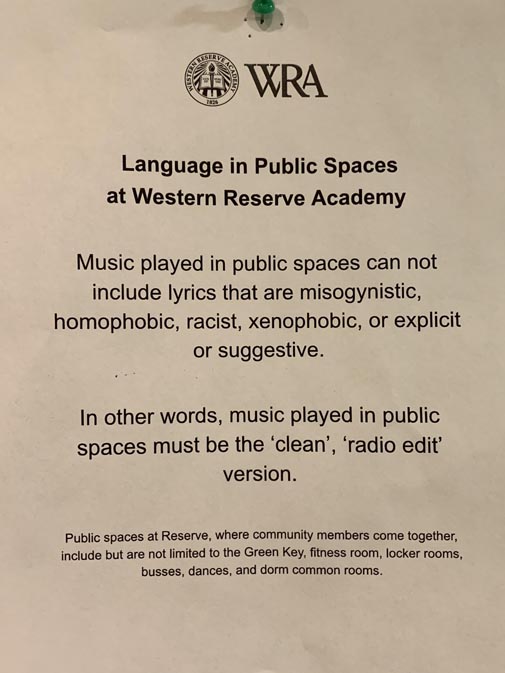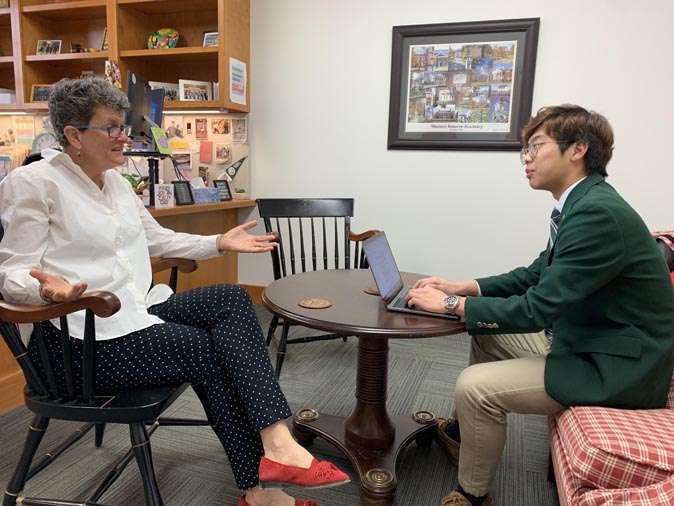Go on Apple Music’s Top 100 chart, or any top charts of whatever platform you use to listen to music, and you will notice that all of the Top 10 songs are labeled as “explicit.” A recent study by Mark Bannister, a customer analytics manager at Expedia, demonstrates that the frequency of swear words in pop music has surged over time, as he illustrates the fact that Billboard Hot 100 from 2017 contained more than two-thirds of the songs that contained explicit lyrics. The data not only suggests that many people prefer to listen to music with offensive vocabulary, but that some may be insulted by the words they hear in certain songs played in communal spaces. Not surprisingly, students at Western Reserve Academy, a private boarding school in Hudson, Ohio, also frequently listen to music with explicit lyrics. Whether it is in the weight room, dormitory, or locker room, one can easily find him or herself in an environment exposed to inappropriate words from the music.
With more students listening to music with explicit lyrics, the school thought that there needed be some control over the music played by the students in public spaces. As a result, the school came up with a new policy titled, “Language in Public Spaces at Western Reserve Academy.” This policy was established to create a welcoming and healthy environment for students by making sure that music played in public spaces at Western Reserve Academy was clean that did not have any explicit words that might offend people.

However, this policy has become a controversial topic in the student population. Some students believe that they cannot enjoy a genuine musicality if they are only allowed to listen to the “clean” versions of the songs. Others argue that despite the vast majority of the student body's preference for explicit music, the school administration is ignoring their opinions and instead is taking the side of the minority.
Regardless, one thing seems clear. No matter how many students oppose inappropriate music, there must be some control over the songs played in public spaces in order to promote the sense of safety and welcome for everyone at the school.
Wendy Skinner, the Dean of Students at Western Reserve Academy, was asked a series of questions regarding the policy banning explicit music:
1. What instances triggered you to come up with this policy?
“We decided to come up with this policy after hearing from students who felt offended by the music played in the Green Key, a student lounge where host mixers, watch movies, and have fun.”
2. Did you have any concerns as you came up with this policy?
“Yes, we thought students might be feeling that their freedom was limited, especially in spaces like the Green Key, where it is mostly student oriented. However, we wanted to make sure that students felt comfortable wherever, whether that is accomplished by having control over the music. In the end, it seems like students came to understand what we were trying to do.”
3. Have you noticed any changes in the community created by this policy?
“At first, we thought not a lot of students were going to show up to the first mixer after the policy was created, but surprisingly, many people came. And at the next mixer, there were even more people. So while students don’t necessarily come to me to tell me ‘I feel comfortable,’ I can clearly see that students are able to more sympathize with the policy and our goal to make sure that everyone feels comfortable.”
4. Do you ever see this newly-created policy overturned and ultimately go back to what it used to be before it was created?
“No.” ■

With the policy, Western Reserve Academy is looking forward to generating an amicable boarding-school environment in which every student can make himself or herself at home. The community is excited to see more positive changes created by this new policy.

James “Jihun” Doh
11th grade
Western Reserve Academy

